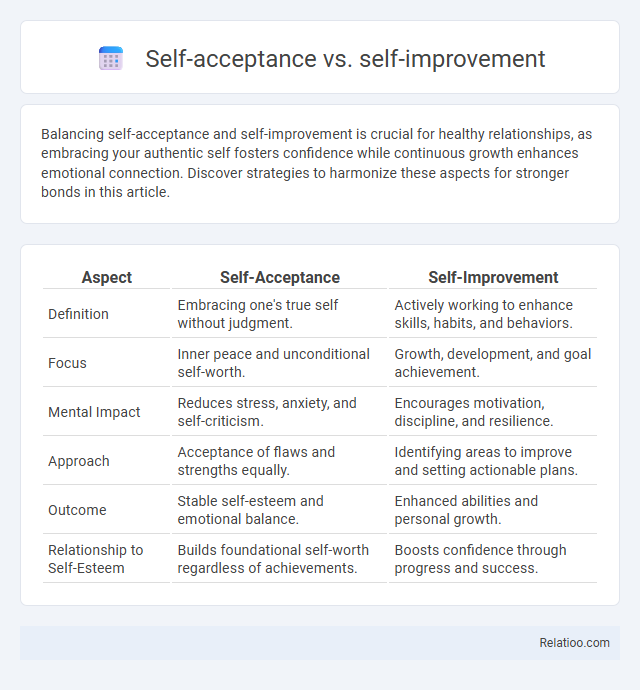Balancing self-acceptance and self-improvement is crucial for healthy relationships, as embracing your authentic self fosters confidence while continuous growth enhances emotional connection. Discover strategies to harmonize these aspects for stronger bonds in this article.
Table of Comparison
| Aspect | Self-Acceptance | Self-Improvement |
|---|---|---|
| Definition | Embracing one's true self without judgment. | Actively working to enhance skills, habits, and behaviors. |
| Focus | Inner peace and unconditional self-worth. | Growth, development, and goal achievement. |
| Mental Impact | Reduces stress, anxiety, and self-criticism. | Encourages motivation, discipline, and resilience. |
| Approach | Acceptance of flaws and strengths equally. | Identifying areas to improve and setting actionable plans. |
| Outcome | Stable self-esteem and emotional balance. | Enhanced abilities and personal growth. |
| Relationship to Self-Esteem | Builds foundational self-worth regardless of achievements. | Boosts confidence through progress and success. |
Understanding Self-Acceptance: Embracing Who You Are
Understanding self-acceptance involves embracing who you are without judgment, recognizing your strengths and flaws as integral parts of your identity. While self-improvement focuses on growth and change, self-acceptance provides a foundation of unconditional self-love that fosters resilience and mental well-being. You can achieve a balanced mindset by integrating acceptance with intentional growth, creating a harmonious path toward authentic personal development.
The Essence of Self-Improvement: Striving for Growth
Self-improvement centers on the continuous pursuit of personal growth, emphasizing skill enhancement, mindset development, and goal achievement. It involves recognizing areas for change while maintaining a balanced self-awareness that fosters resilience and motivation. This dynamic process contrasts with self-acceptance, where embracing one's current state cultivates inner peace without the pressure of constant change.
Self-Acceptance vs Self-Improvement: Key Differences
Self-acceptance involves embracing your current qualities and limitations without harsh judgment, fostering emotional well-being and resilience. In contrast, self-improvement focuses on actively setting goals and making changes to enhance skills, behaviors, or mindset for personal growth. Understanding this distinction helps you balance appreciating who you are with the motivation to evolve, promoting a healthier, more sustainable path to fulfillment.
How Self-Acceptance Fuels Personal Growth
Self-acceptance creates a foundation of inner peace that empowers you to embrace your strengths and weaknesses without judgment, fostering genuine self-improvement. When you fully accept yourself, your motivation shifts from fear of inadequacy to a desire for growth rooted in authenticity. This balance between acceptance and ambition nurtures sustainable personal development, enhancing emotional resilience and overall well-being.
The Pitfalls of Pursuing Perfection in Self-Improvement
Pursuing perfection in self-improvement often leads to unrealistic expectations, resulting in chronic dissatisfaction and burnout. Emphasizing self-acceptance helps maintain emotional resilience by acknowledging inherent flaws without harsh judgment. Balancing self-acceptance with growth-oriented goals fosters sustainable progress while avoiding the psychological pitfalls of perfectionism.
Striking a Balance: Integrating Acceptance and Growth
Striking a balance between self-acceptance and self-improvement involves recognizing one's inherent worth while actively pursuing personal growth. Embracing self-acceptance reduces self-criticism and fosters mental well-being, whereas self-improvement drives goal-setting and skill development. Integrating these concepts supports sustainable progress by valuing present qualities and motivating positive change.
Common Myths About Self-Acceptance and Self-Improvement
Common myths about self-acceptance include the belief that it means complacency or giving up on growth, while self-improvement is often misunderstood as constant self-criticism or dissatisfaction. Your journey involves balancing these concepts by embracing your inherent worth without ignoring areas for growth. Understanding that self-acceptance fosters motivation rather than hinders progress is key to personal development.
Practical Strategies for Fostering Self-Acceptance
Practical strategies for fostering self-acceptance include mindfulness practices that promote present-moment awareness and reduce self-criticism, as well as journaling techniques focused on identifying and challenging negative self-beliefs. Emphasizing self-compassion through affirmations and cognitive reframing helps individuals embrace imperfections without judgment, strengthening emotional resilience. Establishing boundaries and engaging in activities aligned with personal values further cultivate authentic self-acceptance, balancing growth with unconditional self-respect.
Building Sustainable Self-Improvement Habits
Building sustainable self-improvement habits requires balancing self-acceptance with goal-driven growth, fostering a mindset where acknowledging current strengths and limitations supports continuous development. Emphasizing small, consistent actions rooted in self-compassion enhances motivation and reduces burnout, enabling lasting behavioral change. Integrating mindfulness practices and realistic goal-setting cultivates resilience, ensuring self-improvement efforts are both achievable and aligned with authentic self-acceptance.
Achieving Harmony: Choosing Both Self-Acceptance and Self-Improvement
Balancing self-acceptance and self-improvement is crucial for personal growth, as embracing your current strengths and weaknesses fosters a positive mindset while pursuing growth goals enhances your potential. Achieving harmony requires recognizing that self-acceptance provides a foundation of self-worth, which fuels motivation for continuous development without harsh self-judgment. Integrating both approaches empowers you to evolve authentically and sustainably.

Infographic: Self-acceptance vs Self-improvement
 relatioo.com
relatioo.com